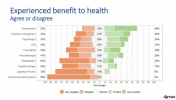Utsikt
Senior Member (Voting Rights)
I also wonder about this section. I think it’s very ambiguous.They consider the bio-psycho-social model to be a possible explanatory model for the maintenance of symptoms, but based on their own social science research (the social component of the model) they can only support hypotheses that social relationships between patients and services are of such a nature that they can have a disease-maintaining, and perhaps aggravating, effect.
If we take «social relationship» to mean any aspects of the interaction between e.g. NAV and a patient, including the consequences of mandated treatments and measures, and the abuse and neglect, and we take «disease» to mean the totality of the patient’s health, then the statement is so vague that it doesn’t really mean anything.
But it could also be interpreted as saying that the patient’s ME/CFS could improve if NAV trusted them and didn’t abuse them. And that is a problematic claim because while some might be able to avoid deterioration due to repeated and/or excessive PEM caused by NAV, we really don’t have a foundation to support general statement regarding that avoiding PEM could improve your ME/CFS (i.e. not maintaining it to the same degree anymore).
If we take it even further, it could be interpreted as saying that if the patient just felt trusted etc. they would get better.
I understand that it’s a summary and that Kielland & Co might have said and intended something more specific and unproblematic. But the context of the meeting should make it obvious that we need precision if we want to avoid further harm to the patients.

